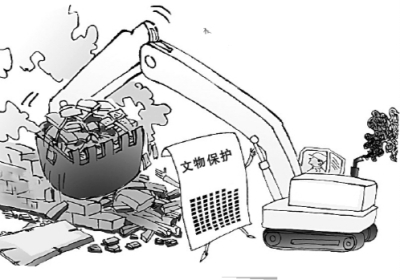Developers raze ancient tombs
【core】Five ancient tombs were destroyed overnight in Guangzhou's Luogang district to make room for a metro project on Saturday, raising concern over the protection of relics as economic construction in the Guangdong provincial capital speeds up

Five ancient tombs were destroyed overnight in Guangzhou's Luogang district to make room for a metro project on Saturday, raising concern over the protection of relics as economic construction in the Guangdong provincial capital speeds up.
Zhang Qianglu, an official with the Guangzhou Archaeological Institute, said the destroyed tombs were pre-Qin (the Spring and Autumn Period and the Warring States Period, 770-221 BC) era and were valuable for archaeological study and research of the city's ancient past.
Many archaeologists and workers were still investigating at the site in Luogang's Dagong Mountain area on Friday afternoon, before the tombs were found to have been bulldozed on Saturday morning, with many artifacts destroyed or damaged, Southern Metropolis Daily reported on Sunday.
An executive in charge of the metro project named Zhao admitted his workers had destroyed the tombs, saying it was a misunderstanding between the workers and authorities because they did not know the tombs could not be bulldozed.
Guangzhou Metro Corporation said they received the city archaeological institute's permission for the metro project in May.
But Miao Hui, an institute official, denied that the institute had given the green light for the construction work on the metro project.
"We officially notified the builders to stop construction on May 28 so as to avoid destroying the ancient tombs and relics," Miao told local media. Miao is in charge of the archaeological work at the site.
Zhang said a large number of ancient tombs have been discovered in the Dagong Mountain area in previous years.
"The ancient tombs, which cover an area of more than 20,000 square meters, have become important sources for the study of Guangzhou's lifestyle and culture in ancient dynasties," Zhang said.
Local archaeologists said about 10 of the ancient tombs have been destroyed by construction on the metro project.
The work was halted for further investigation on Sunday.
On Tuesday, two historical structures were bulldozed around midnight by real estate developers without the authorization for the reconstruction of the old city in Guangzhou's Liwan district.
The illegal destruction of Jinlingtai and Miaogaotai, the two structures built during the Qing Dynasty (1640-1911), had also raised great concern about the protection of historical buildings as the southern metropolis is renewed amid rapid economic growth. Many historical buildings have been illegally razed for industrial and real estate projects.
City authorities deny having permitted property developers to destroy or damage historical buildings for real estate of other projects.
Authorities have promised to fully investigate the new case and punish the developers who violated laws and ordinances.
Tang Guohua, an architectural expert from Guangzhou University, called for stiff penalties for any developers who have destroyed historical buildings and relics.
"Authorities can impound the land developers have acquired if investigations show they destroyed the historical structures and artifacts," Tang told local media.
Meanwhile, the city will adopt new ordinances to help protect its large number of historical buildings and increase the penalties for those who violate the regulations in the coming months.
"Guangzhou can learn the successful experience of the Hong Kong special administrative region in protecting historical buildings and relics. Destroying and damaging buildings and relics is be severely punished in Hong Kong," Tang said.
Yin Fuqiang, a lawyer at the Longan Law Firm, said people who intentionally destroy or rob ancient tombs are usually sentenced 3 to 10 years in prison, but those who commit lesser offenses might serve less than three years behind the bars or even be put on probation.
"The punishment is not serious enough to deter the criminals," he added.
zhengcaixiong@chinadaily.com.cn

 PRINT
PRINT CLOSE
CLOSE